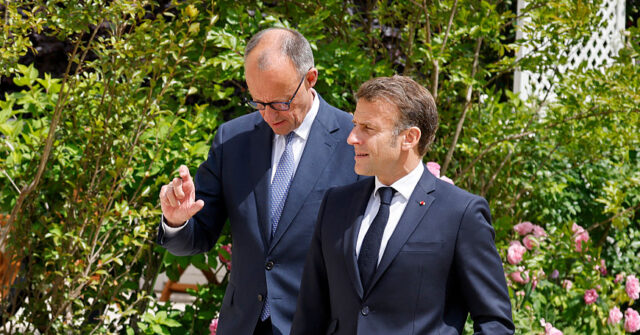Friedrich Merz is spending his first day as leader of Germany visiting France and Poland, promising a “fresh start” to EU relationships and signalling defiance to President Trump in saying they will never accept an “imposed” peace on the Ukraine War.
The French President Emmanuel Macron welcomed newly appointed Chancellor Friedrich Merz in Paris on Wednesday, the leaders of the two largest and richest countries in Europe publishing a joint statement vowing greater cooperation on defence, economics, and the Ukraine War. Merz will later today travel to Poland for more meetings, which in both cases he said were to launch a “fresh start” in relations with his eastern and western neighbours.
France and Poland are also major partners for Germany on the continued effort to underwrite Ukraine’s armed forces, and Merz announced today a first trip as Chancellor to Ukraine “in the coming weeks”.
Outlining the areas the revitalised Franco-German partnership will be focussing on — identified as “war on our continent, fierce global competition, accelerating climate and technological change, and threats of a global trade war” — Merz and Macron published a joint statement in French broadsheet Le Figaro this afternoon.
Much of the document focussed on defence issues and the Ukraine war, including promises to boost military procurement in Europe and strengthen “NATO’s European pillar” with increased spending. While vowing to do more on both European security and supporting Kyiv, the two leaders wrote in implied barbs at U.S. President Donald Trump and his peace process.
Writing they would reject a peace proposal in Ukraine if it didn’t meet Europe’s idea of how the war should end, they said: “We remain united and firmly committed to a sovereign and independent Ukraine. We will never accept an imposed peace, and we will continue to support Ukraine against Russian aggression”.
The European Union has already stated it would refuse to acknowledge any Ukrainian territory being conceded to Russia in order to achieve a cessation of hostility, something American negotiators believe is crucial, essentially committing Europe to backing permanent war in a conflict that has been all but static for years.
This ding of Trump aside, the men did acknowledge that Europe can’t bring peace in Ukraine without America. They said: “We stand ready to contribute, once such a ceasefire is in place, to a just and lasting peace, with U.S. security support, and strong security guarantees, including a strong Ukrainian military, to deter future Russian aggression. We will also take a concerted approach to Russia and the systemic threat it poses to European security.”
These remarks were not the only Merz attack on Trump in his first day in office, either, with a separate interview refuting American criticisms of backsliding democracy in Germany where the nation’s main opposition party is now being spied on by the national domestic intelligence agency and even faces being banned outright.
Remarkably, there was also implicit criticism for the European Union as well, with Merz and Macron citing the urgent need to reduce the Union’s “administrative burdens, which are stifling growth”. This would be achieved by “removing constraints”, they said.
The trip to France, and then to Poland, comes the day after Merz was sworn in as Chancellor of Germany, but only after months of coalition negotiations leading to an ignominious
first defeat on Tuesday when Merz failed to be elected by the Bundestag on the first try. Humiliatingly, this is the first time that has happened in the modern German state and underlines just how precarious his wafer-thin majority in that parliament is, auguring ill for future stability from the economic powerhouse of Europe.
Read the full article here
